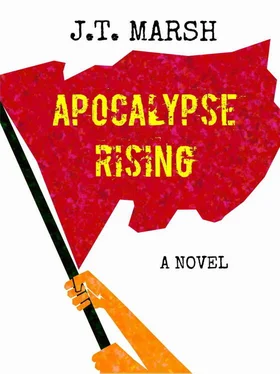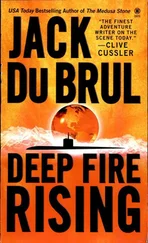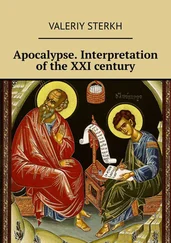In the midst of this crisis, Valeri’s true work begins. As news breaks of a trade deal unlike any before signed between countries, it becomes widely known this’ll surely put even more working men out of work. Valeri pledges his life in service of the opposition. But he’s not alone. At the church, there’s an undercurrent running through the pews, a spirit parishioners like Darren Wright can sense but never see. It’s this spirit which compels Darren to pray for guidance in troubled times. He comes to church more often, one weeknight praying silently in the pews when there appears at his side a younger woman. She says, “I hope you’ve found more inspiration lately than I have.” She says her name’s Sheila Roberts, and for a moment Darren thinks she might be a vision in answer to his prayers. “I’m afraid I have to disappoint you,” he says. But she invites him to a meeting of concerned parishioners, the laymen organizing in the face of the church’s inaction. The church may be bride to Christ’s bridegroom, but Darren and Sheila find themselves among they who have come to believe the bride has strayed too far. As it is written in Proverbs 29:2, ‘When the righteous are in authority, the people rejoice: but when the wicked beareth rule, the people mourn.’ This is a truth all too evident to men like Darren and women like Sheila as their brothers and sisters among the parishioners have come to see wickedness in the halls of power.
Still the conversations meander through the days, idle chatter mixing freely with wistful ideation. “Give me a lift to the station?” one woman asks. “Climb on behind, but mind you hold on fast,” says another. A third interjects, “We’ll meet again someday. Don’t forget me.” It’s an unknown exchange in one apartment block somewhere in the maze of blocks that make up the working class districts, but an unknown exchange with profound meaning. Elsewhere, as their friendship deepens through a series of unlikely coincidences, Valeri and Maria find common ground where neither would’ve before expected it. Over the days that turn quickly into weeks, theirs is a shared cause, which they realize in a mutual struggle against a common enemy. There’s no moment when this takes place; he seeks her out, and at first she rebuffs him, but he persists. Finally, he offers to pay for her time, and she reluctantly, half-suspiciously agrees. Again they sit in her little one-room apartment, alone but for the rage of the streets filtering in through that same broken window, and she looks uncomfortably at the clock every so often. Still she sits on the edge of the bed while he sits on her one chair, the two exchanging small talk until, near the end of his time with her that afternoon he says, “you must join the fight for a new tomorrow.” But the words seem to fall on deaf ears. She’s not ready to commit herself irrevocably to the struggle. Although he can’t see it, nor is Valeri, although they’re drawing closer to commitment with each passing day. Hidden among the criminals, the prostitutes, and the mentally ill addicts there’s an element that lives off the enterprise of the working man’s most degraded and dejected form. It’s a hopeless feeling, to be made unwelcome in your own home, to be made to feel an outcast on the very streets that’d raised you, to be made to seek refuge from deprivation in a world where an abundance exists. After Garrett Walker and his family have found eviction notices posted to their front doors, everything changes. At the dinner table the next time all four gather, Garrett says, “we’ll live with my mother in Surrey for a while.” His wife objects, saying, “she lives in a one-bedroom flat. There’s not enough room for us all.” But Garret says, “it’ll only be for a little while. Once I’ve found work again, we’ll get our own place, somewhere.” The dining room is silent but for the ticking and rattling of the refrigerator on the fritz. Left unsaid is the understanding there’s little work to be found, none of it paying well enough. It makes Garrett feel helpless and emasculated, powerless to protect and provide for his family in the face of the overwhelming despair of unemployment. But he won’t feel this way for long, as there’re those lurking still in the shadows who would empower him.
At the union hall, out-of-work workers talk. “A skilled worker won’t go under in the villages these days,” says one worker. “There’s as much work to be had as you might want,” says another. Both know it was never for want of work that they’re made to languish at the hall along with many others. There’s plenty of work and there’s plenty of workers; this is the question of our time. After that hour together, Valeri hasn’t the money to pay for another hour, having worked to save such a sum for more than two months. Only later does he realize she has not paid her rent in a long while, the money he gave her being instead put to use paying for a new winter coat in anticipation of the coming season on the street. Never left in the open, we all look like her at one point in our lives, she being the strongest in her weakness, the bravest in her fear, the wisest in her narrow, short-term outlook on life. The next time Valeri sees her, not walking the street but in a shop buying food, he dares not approach her, instead exchanging with her a knowing glance from across the grocery store’s aisle as they pass one another, that little light behind her eyes suggesting she has begun to feel something for him, if not love then something that might well yet blossom into love. But it’s all a fraud. It’s a false narrative, framed within the confines of the human heart, made to seem more than what it is. At the armoury, Colonel Cooke puts Craig Thompson and the rest of the brigade through a series of drills and musters, while imposing a strict curfew on the men. Naturally, no reason for the change, leaving the men to come up with their own. “We might be deployed abroad,” says Craig in the bunks after hours. “Where?” asks another. “Who knows? Ukraine maybe,” says Craig. “They’re going to want us to fight the Russians,” says the other. “I won’t go to die for some imperial ambition,” says Craig. And the rest of the brigade share his feelings. But these are young men serving in want of a paycheque. In times of crisis, the war in the streets of their own homes is the war of real concern for ordinary troopers like them.
Over the past several months, Valeri’s been meeting with his neighbours, never sitting down with them and talking at length but running into them in the halls on his way to work or in the laundry room. It’s the little moments that add up over time, the traded glances and the half-serious exchanges that began to tend Valeri towards action. In these radical times, men like Valeri are soon to find themselves at the head of a burgeoning movement which the dark essence may yet choose to use to give itself expression, and with expression, life. But we’re not there yet. While Stanislaw Czerkawski’s ruthless boss never hesitates to fire anyone who looks at him the wrong way, Stanislaw has come to tire of holding his tongue. “I need to stay put,” he says, sharing views with one of the workers on their break, “but sometime my turn will come.” His fellow worker, another Pole, agrees. “It seems so hopeless,” says Stanislaw, “for I have so little. Why do we act as though those with the least to lose are the most afraid to stand?” But soon their break is over and they’re all back cleaning floors and scrubbing toilets. His mind wanders, and he stands tall in a clear picture he has for the future, and once he’s finished cleaning one room but before he moves onto another he looks abroad for his troubles. If he’s afraid of losing his meagre living, then soon he will have no longer any reason to fear. Among the Poles who form this permanent underclass, there’s a grim certainty, and Stanislaw’s wife shares with him a sad, sad perception of gloom.
Читать дальше











